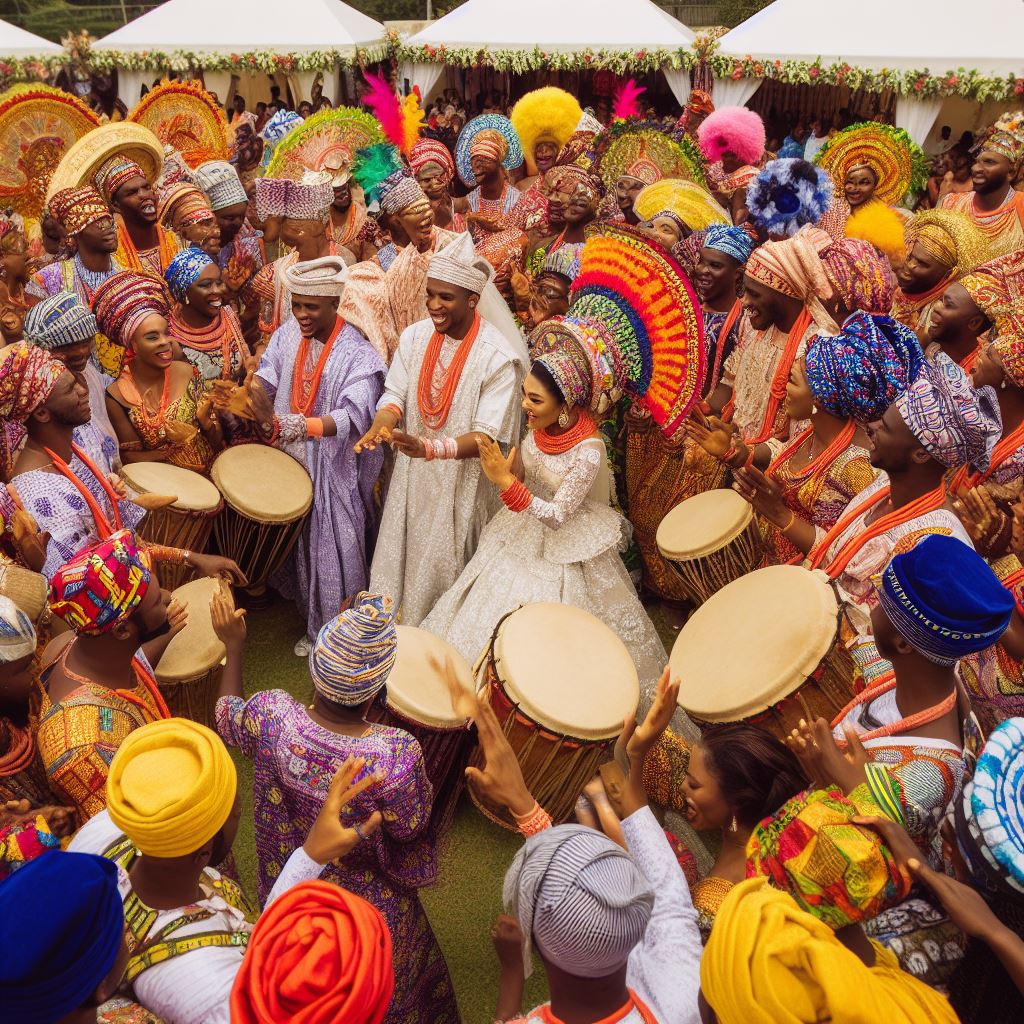The History of Marriage Documentation in Nigeria Explored
Last Updated on October 27, 2023
Introduction
Marriage documentation in Nigeria has a rich history that deserves exploration.
This blog section aims to delve into the importance of marriage documentation in Nigeria and the significance of understanding its history.
Brief explanation of the importance of marriage documentation in Nigeria
Marriage documentation plays a crucial role in Nigerian society, serving both legal and social purposes. It ensures the legality of marriages and protects the rights of individuals within marital unions.
Overview of the significance of exploring the history of marriage documentation in Nigeria
- Understanding the history of marriage documentation in Nigeria provides insights into cultural practices, societal norms, and legal frameworks surrounding marriage.
- It allows us to trace the evolution of marriage documentation and its impact on Nigerian communities.
- Marriage documentation reflects the diversity of Nigerian cultures and traditions, highlighting the different customs and rituals associated with weddings.
- Exploring its history helps preserve these traditions and promotes cultural heritage.
- Furthermore, studying the history of marriage documentation sheds light on the social, economic, and political changes in Nigeria over time.
- It reveals how marriage laws and customs have shifted, reflecting the changing dynamics within society.
- By examining the past, we can better appreciate the present and anticipate future developments in marriage documentation.
- It enables us to identify areas for improvement, ensuring that marriage practices in Nigeria evolve in line with societal needs and human rights standards.
In summary, the exploration of the history of marriage documentation in Nigeria is essential to understand its significance and ensure its continued relevance in modern Nigerian society.
By recognizing its importance and learning from the past, we can contribute to the preservation and improvement of marriage practices in Nigeria.
Pre-colonial Era
Traditional marriage practices in Nigeria before European colonization
During the pre-colonial era in Nigeria, traditional marriage practices were predominant.
Documentation methods used by various ethnic groups
Before European colonization, each ethnic group had its own unique way of documenting marriages.
- The Yoruba tribe, for example, used oral traditions and symbolism to record marriages.
- The Igbo people relied on witnesses and the exchange of gifts to document the union.
- Documentation methods varied among other groups such as the Hausa, Fulani, and Ibibio.
These methods ensured that marriages were recognized within the community and had legal standing.
Cultural and religious influences on marriage documentation
Cultural and religious influences played a significant role in marriage documentation.
The practice of polygamy, for instance, was common in Nigeria’s traditional societies.
- Polygamous unions were documented differently to differentiate between the first and subsequent wives.
- Islamic and Christian religious influences brought new documentation practices to Nigeria.
- Under Islamic law, marriage contracts called “Nikah” were signed by the bride, groom, and witnesses.
- Christian missionaries introduced the concept of having marriage certificates issued by the church.
Colonial rule further impacted marriage documentation in Nigeria.
As Europeans established their presence, new legal structures were imposed on traditional practices.
- The introduction of marriage registries by the colonial government standardized documentation.
- Marriage certificates obtained from these registries carried legal weight and were recognized by the state.
- Intermarriages between Nigerians and Europeans faced additional documentation requirements.
Despite these changes, traditional marriage practices continued to coexist with the colonial documentation system.
After Nigeria gained independence, the documentation of marriages evolved due to societal changes.
- Urbanization, globalization, and increased education levels influenced how marriages were documented.
- Registry marriages became more popular, ensuring legal protection and inheritance rights.
- More emphasis was placed on obtaining marriage certificates as proof of marital status.
Various challenges remained in the documentation of marriages in Nigeria
- Some couples face difficulties in obtaining relevant documents due to bureaucratic processes.
- Issues of underage marriages and forced unions also affect the accuracy of documentation.
- Nonetheless, efforts have been made to streamline the documentation process and enforce legal requirements.
In short, the history of marriage documentation in Nigeria reveals a complex and evolving system.
From pre-colonial practices to colonial impositions, and modern influences, marriage documentation in Nigeria has adapted.
While challenges persist, the documentation of marriages remains an essential aspect of Nigerian society.
Read: Step-by-Step: How to Properly Fill Out Nigeria’s Marriage Form
Colonial Era
- The British introduced Western-style marriage registries in Nigeria during the colonial era.
- Marriage licenses and certificates were implemented to formalize marriages in the country.
- Nigerian couples faced several challenges in obtaining and maintaining their marriage documentation.
- The British legal system had a significant influence on the practices and procedures of Nigerian marriage documentation.
Introduction of Western-style marriage registries by the British
During the colonial era in Nigeria, the British administration introduced Western-style marriage registries as part of their efforts to bring modernization to the country.
These registries were established to facilitate the documentation and formalization of marriages.
Implementation of marriage licenses and certificates
- Prior to the introduction of marriage licenses and certificates, Nigerian traditional marriages were primarily recognized through cultural and customary practices.
- However, the British saw the need to implement a more formal system to align with their own legal framework.
- The introduction of marriage licenses ensured that marriages in Nigeria were legally recognized by the British government.
- Couples were required to obtain a license before their marriage could be considered valid. This license served as evidence of the legal union.
- In addition to licenses, marriage certificates were also issued to couples after their marriage ceremony.
- These certificates provided further evidence of the marriage and were essential for legal purposes such as inheritance, property rights, and divorce proceedings.
Challenges faced by Nigerian couples during this period
Despite the intentions behind the implementation of marriage licenses and certificates, Nigerian couples faced numerous challenges during this period.
- Obtaining a license and registering a marriage was often a bureaucratic and time-consuming process.
- Couples had to navigate through various administrative hurdles and pay fees to complete the documentation.
Influence of the British legal system on Nigerian marriage documentation
- Furthermore, the British legal system heavily influenced the practices and procedures of Nigerian marriage documentation.
- Laws and regulations regarding marriage were largely based on British laws, which may not have aligned with traditional Nigerian customs and practices.
- This created a conflict between traditional marriage practices and the legally recognized documentation required by the British authorities.
- Nigerian couples had to adapt to these new legal requirements, often compromising or modifying their traditional practices to meet the British standards.
- While the introduction of Western-style marriage registries and documentation had its challenges, it also brought about certain benefits.
- The formalization of marriages through licenses and certificates provided legal protection and rights for Nigerian couples.
- Marriage certificates, for example, served as a proof of marriage, granting couples access to legal benefits such as inheritance rights and social security benefits.
- It also provided a means for couples to dissolve their marriage through divorce proceedings.
In fact, the colonial era in Nigeria witnessed the introduction of Western-style marriage registries, licenses, and certificates by the British administration.
Although these changes brought about challenges for Nigerian couples, they also provided legal recognition and protection for their marriages.
Read: Unique Anniversary Wishes Inspired by Nigerian Folklore

Post-colonial Era
- The post-colonial era in Nigeria marked a transition from colonial marriage documentation to indigenous systems.
- During this period, there was a shift in focus from western practices to traditional Nigerian customs.
- Indigenous marriage systems became more prominent, as they reflected the cultural diversity of the nation.
Transition from Colonial Marriage Documentation to Indigenous Systems
- Prior to independence, marriage documentation in Nigeria was primarily influenced by colonial laws and regulations.
- The colonial administration introduced a centralized system for registering marriages based on Western standards.
- However, with the end of colonization, there was a growing desire to embrace indigenous practices and traditions.
- This led to a transition from colonial marriage documentation to the recognition and acceptance of indigenous systems.
Rise of Alternative Documentation Methods
- Alongside the transition, alternative documentation methods emerged, particularly customary and Islamic marriages.
- Customary marriages, rooted in indigenous traditions, gained legal recognition as valid forms of marriage documentation.
- Islamic marriages, governed by Islamic law, also became widely accepted and recognized in Nigeria.
- These alternative methods provided individuals with a choice in how they documented their marriages.
Introduction of the Marriage Act of 1914 and Subsequent Amendments
- The Marriage Act of 1914 was introduced during the colonial era and continued to be enforced post-independence.
- It provided a legal framework for the registration and documentation of marriages in Nigeria.
- Subsequent amendments were made to the act to address cultural, religious, and societal changes within the country.
- These amendments aimed to accommodate diverse marriage practices and ensure legal protection for all parties involved.
Changes in Marriage Documentation Practices in Different Regions of Nigeria
- Due to Nigeria’s cultural and ethnic diversity, marriage documentation practices vary across different regions.
- In the northern regions, Islamic marriages and the Shariah legal system play a significant role in documentation.
- Customary marriages are more prevalent in the southern regions, reflecting the traditions and customs of various ethnic groups.
- These regional variations highlight the importance of recognizing and respecting the diverse marriage documentation practices in Nigeria.
In summary, the post-colonial era in Nigeria witnessed a transition from colonial marriage documentation to indigenous systems.
Alternative documentation methods, such as customary and Islamic marriages, gained recognition. The Marriage Act of 1914 provided a legal framework for documentation, which went through subsequent amendments.
Different regions of Nigeria exhibited varying marriage documentation practices, reflecting cultural diversity. Understanding and acknowledging these changes is crucial for preserving Nigeria’s rich marital traditions.
Read: Marriage Milestones: Custom Wishes for Each Year in Nigeria
Contemporary Era
- In the contemporary era, the process of documenting marriages in Nigeria has undergone significant changes.
- Previously, marriage documentation was a complex and time-consuming process, involving numerous paperwork and visits to government offices.
- However, with the advancement of technology and the introduction of digital systems, the marriage registration process has become more streamlined and efficient.
Current Marriage Documentation Processes and Requirements in Nigeria
- In Nigeria, couples who wish to get married are required to fulfill certain criteria and follow specific procedures.
- They must provide proof of age, identity, and nationality through relevant documents such as birth certificates and passports.
- In addition, couples are mandated to give a notice of marriage, which is a legal document stating their intent to marry.
- This notice is displayed for a specified period to allow objections from anyone who might have a valid reason to prevent the marriage.
- Failing to meet any of these requirements can lead to the rejection of the marriage registration application.
Role of Technology in Modernizing Marriage Registration
- Technology has played a crucial role in modernizing the marriage registration process in Nigeria.
- The introduction of online portals and registration systems has made it easier for couples to submit their marriage applications.
- These digital platforms allow them to upload required documents, pay necessary fees, and schedule appointments online.
- This not only saves time but also reduces the chances of errors and delays that were common in the past.
- Furthermore, technology has enabled the government to have a centralized database of registered marriages, ensuring better record-keeping and accessibility of information.
Issues and Challenges Faced in the Documentation of Marriages
- Despite the improvements brought about by technology, there are still challenges faced in the documentation of marriages in Nigeria.
- One recurring issue is the prevalence of fraudulent marriages, where individuals enter into fake marriages for personal gain.
- Another challenge lies in ensuring that marriages are accurately recorded, as errors or omissions can result in legal and social consequences in the future.
- Furthermore, access to technology and digital literacy remains a barrier for some couples, especially in rural areas.
- These challenges highlight the need for continued efforts to improve the marriage registration process to ensure its integrity and effectiveness.
Importance of Accurate Marriage Documentation for Legal and Social Purposes
- Accurate marriage documentation holds immense importance for legal and social purposes.
- Legally, it serves as proof of the union between two individuals, granting them various rights and responsibilities.
- It allows couples to access social benefits, inheritance rights, and even divorce procedures, if necessary.
- Additionally, accurate documentation helps in preventing bigamy and other illegal practices, safeguarding the institution of marriage.
- Socially, it provides a sense of security and legitimacy to couples and their children within society.
- Moreover, accurate records assist in demographic analysis, policy-making, and planning for social development.
In essence, the contemporary era has witnessed significant improvements in the documentation of marriages in Nigeria.
With the adoption of technology and streamlined processes, couples can now register their marriages more efficiently.
However, challenges remain, and efforts must be made to address issues such as fraud and accessibility.
Accurate marriage documentation holds immense legal and social importance, ensuring individuals’ rights and contributing to societal development.
Read: Celebrate Love: Top Anniversary Quotes from Nigerian Celebrities
Conclusion
Recap of the historical development of marriage documentation in Nigeria
In the end, this section has explored the historical development of marriage documentation in Nigeria.
From the traditional practices of oral agreements to the introduction of written records during colonization, the evolution of marriage documentation reflects the changing social and political landscape of the country.
Reflection on the significance of understanding this history
- Understanding this history is significant as it sheds light on the cultural and legal aspects of marriage in Nigeria.
- It allows us to appreciate the importance placed on marital unions and how they have been recognized and regulated over time.
- However, it is essential not only to understand this history but also to preserve and improve marriage documentation practices in Nigeria.
- Ensuring accurate and accessible records is crucial for legal and social purposes, such as inheritance rights and safeguarding against domestic violence.
Call to action to preserve and improve marriage documentation practices in Nigeria
- Therefore, there is a call to action for the government, legal institutions, and communities to collaborate in implementing efficient and effective marriage documentation systems.
- This includes digitizing records and providing education and awareness about the importance of proper documentation.
- By preserving and improving marriage documentation practices, Nigeria can enhance legal protections, promote gender equality, and ensure the recognition and respect of individual rights in marital relationships.


